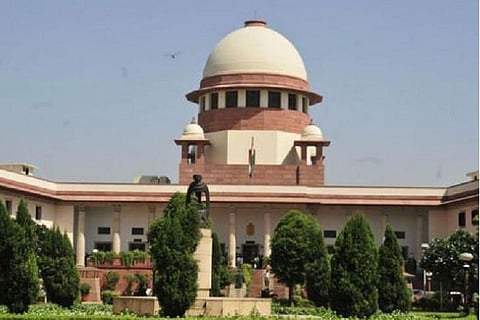

The Supreme Court on May 18 invoked its ‘extraordinary powers’ under Article 142 of the constitution to free AG Perarivalan, one of the seven convicts in the Rajiv Gandhi assassination case. Perarivalan who is 51 years old now, was given a life sentence in the case, for buying batteries used in the bomb that killed the former Prime Minister, without knowing how the batteries were going to be used.
He has since served a prison term for 30 years - more than half of his life. And the battle to secure his release had been an ongoing tussle between the Tamil Nadu government and the Governor, since 2018.
On Wednesday, while delivering its judgement, the bench comprising Justice L Nageswara Rao, Justice BR Gavai and Justice AS Bopanna cited the inordinate delay and lack of decision making by the Tamil Nadu Governor in pardoning Perarivalan under Article 161 of the Constitution. So what are Articles 142 and 161 of the Constitution, that form the legal crux of AG Perarivalan’s right to mercy?
Every once in a while, the Supreme Court invokes this constitutional provision that provides unique and extraordinary powers to the apex court to do ‘complete justice’ in any case pending before it. In legal matters where existing laws or statutes fail to provide a remedy, the top court can invoke its special powers under Article 142 to rule on the case. On Wednesday, the court once again invoked its special powers to free Perarivalan,
In the past, the top court has invoked Article 142 in several high profile cases of national importance including the 1989 Union Carbide case and the 2019 Ayodhya Ram Mandir verdict, where the top court handed over the 2.77 acres of disputed land to a trust which was to be formed by the Union government within three months, for the building of a temple. In 1989, the Supreme Court once again used its extraordinary powers to get the US-based Union Carbide Corporation to pay $470 million to the victims of the Bhopal Gas Tragedy.
On Wednesday, the court in its judgment stated that the Tamil Nadu Governor had taken a very long time to decide on Perarivalan’s mercy plea, thereby ruling that Perarivalan be freed. It was in September 2018 that the Tamil Nadu Government had first recommended to the then Governor Banwarilal Purohit that all the seven convicts in the Rajiv Gandhi assassination case be released, under Article 161 of the Constitution.
However, the Governor sat on the state’s recommendation for months together before sending the petition to the President under Article 161, which clearly allowed the Governor to decide on Perarivalan’s release.
While arguing the case in the Supreme Court, Tamil Nadu counsel Rakesh Dwivedi submitted “The real flaw is the Governor going against the state's decision. Even if he had found that the state had no executive power, he could have returned it for reconsideration, but he sat over it and then referred the matter to the President under Article 161! How do you drag the President in this? The Constitution explicitly mentions where the President has to intervene”.
Under this constitutional provision, “the Governor of a state shall have the power to grant pardons, reprieves, respites or remissions of punishment or to suspend remit or commute the sentence of any person convicted of any offence against any law relating to a matter to which the executive power of the State extends”. By this definition, the TN Governor had the power to pardon Perarivalan who was convicted under Section 302 of the Indian Penal Code.
While hearing the case, the Supreme Court also questioned why the Governor had forwarded the mercy plea to the President. “The question is about the power of the Governor and not about the President's decision on it,” the bench added, and said that it will have to look into whether the Constitution allows the Governor to forward state decisions to the President, and what the Governor could have done in this situation.
While delivering its judgment, the Supreme court refused to accept the Union government’s position that the President had the exclusive right to grant remission in cases under section 302 of the IPC.